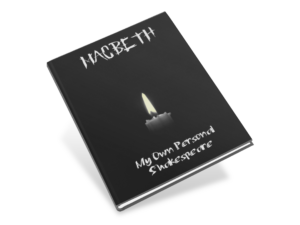I’ve heard it a thousand times, “Shakespeare wasn’t meant to be read. He’s meant to be performed.” And sure, yes, go see Shakespeare. I’d never say don’t do that. But that doesn’t mean reading Shakespeare is a lesser experience. In fact, I’d say the opposite.
There’s an opportunity for depth in reading Shakespeare that live performance can’t offer. Theatre is ephemeral. Blink and you’ll miss something important – a gesture, a line, an inflection choice. You can’t pause a stage play. You can’t rewind. But the text? The text is always there, waiting for you to come back to it.
Why Reading Shakespeare Might Be Better Than Watching It
Reading Shakespeare invites close reading in a way most literature doesn’t. Even the longest play, Hamlet, is only about 30,000 words – less than half the size of a typical novel. Caught up in the “oh, the language is so hard and archaic” argument, people miss how powerful this can be. There’s a lot of blank space in Shakespeare. Room for interpretation, Filling in your own thoughts on what he didn’t say, in a way that flows seamlessly with what he did. Was Ophelia pregnant? Whose idea was it to kill Duncan – Macbeth’s, or his wife’s?
When you read a novel, how often do you flip back through 70,000+ words to find a clue? I can’t be the only reader out there who has had that experience of realizing on some random page, “My mind was wandering, I don’t think I remember what happened over the last three pages.”
And with audiobooks, forget it. I love audiobooks, that’s all I listen to in the car. But I can’t tell you how often I’ll be struck with a thought and think, “Wait, what? Hold on, back up …” but you can’t do that. You know how, on a video streaming service, when you try to rewind (or fast forward), some show you the video and some don’t? And how that makes all the difference in being able nail exactly where you want to be? Audiobooks don’t have any of that. Trust me, I’ve often brainstormed my idea of the perfect audiobook app that would somehow keep a transcription going while you listened, allowing you to shout “Bookmark!” at any point and remember where you were for later. (I confess, I’ve sometimes been known to go grab the ebook version of an audiobook when I really, really want to know exactly what I missed.)
With Shakespeare, it’s all right there. I mean, it’s literally public domain, you can grab the text from dozens of sources, for free, whenever and however suits you. And then you can go straight to a scene, pick apart the dialogue, literally examining each word. For extra credit you can even look at multiple editions and compare different decisions that were made. You decide how to interpret what’s said, and more importantly, not said. You become part of the process.
Sure, some of the language will be unfamiliar. But that’s part of the reward. Read slowly. Use online glossaries. Let the context guide you. You’ll be amazed how much meaning unfolds when you stop trying to rush through and instead sit with the words. Half the time, it made no sense only because it went by so fast during that precious live performance that you didn’t have any time to stop and think about it. Now you do, as much as you need.
Shakespeare should be seen, absolutely. Go to the theatre, watch the films, enjoy the performances. But reading Shakespeare is what gives you ownership. It’s what stays with you. Not just “I liked the Fassbender Macbeth,” but “Here’s what I think Shakespeare was really saying.” And if you really want it to stay with you, get your hands on an “annotation copy” that’s intended for you to write down exactly what you feel about individual scenes.
That’s the joy. Not just watching, but thinking. Not just hearing the lines, but developing your own personal relationship with them. Make Shakespeare your own.


There are so many ads on the page, it’s almost impossible to read the post.
I do apologize for that. I recently changed ad providers and am in the process of trying to fine tune it.